Perspective from a postdoc: Corinne Lee-Kubli
Salk has roughly 200 postdoctoral fellows whose science is being impacted by the COVID-19-induced maintenance mode. While some scientific models, such as the tiny worm C. elegans, can be easily frozen for months at a time, experiments involving other model systems, such as organoids—tiny three-dimensional organs in a dish—cannot be so easily paused.
Thus, some essential experiments have continued in order to not disrupt critical projects. Corinne Lee-Kubli, a postdoctoral researcher in the Chalasani lab, just finished the last part of her project testing a new technology, called sonogenetics, which activates neurons non-invasively using ultrasound. She is thankful that she was almost finished with her project when the maintenance mode went into effect. Now, she is looking forward to reviewing the scientific literature, writing up her results and submitting her manuscript to an academic journal.
“Reviewers may suddenly have a lot more time to read new research articles, and I imagine they’ll be more conscientious about what they request in terms of follow-up experiments, since most labs are closed,” says Lee-Kubli. “Theoretically, we could see a surge in scientific publications, which would be very exciting!”
In addition to her research project, Lee-Kubli plans to use her time away from the lab to start writing a draft of a research grant and prepare her applications for her first faculty position. “I think one of the most helpful things I’ve found for maintaining productivity is sticking to a schedule.”
A dedicated schedule has also helped Lee-Kubli and her husband juggle two young children at home. Every day the parents take turns, with one working while the other watches the children. “My husband built the kids a playhouse in the backyard, so that’s helped our family spend more time outside.” Soaking up some San Diego sun helps her family stay positive, despite challenging times.
“I am also grateful to have a supportive and flexible mentor,” says Lee-Kubli. “Dr. Chalasani has kept our weekly lab meetings as well as our individual meetings, to help us develop obtainable goals during the closure.”
The Career Development Committee is also working on initiating a virtual seminar series, where postdocs can present their work and practice job talks. Other faculty members, such as Associate Professor Julie Law, are hosting virtual happy hours for trainees to socialize and release stress. The committee is also suggesting that faculty members discuss individual development plans with each trainee to set career goals and next steps.
“I appreciate how the coronavirus and the associated risks were taken seriously by Salk,” says Lee-Kubli. “Knowing that I could trust the decisions of Salk’s coronavirus Task Force helped alleviate stress and take pressure off the situation. Now, I can focus on my work.”
[ssba]
Support a legacy where cures begin.
Featured Stories
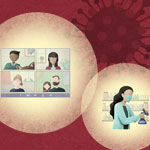 Apart but togetherAs COVID-19 spreads across the world, organizations like the Salk Institute have mobilized to respond. In this feature article, read about how the Institute is adapting and continuing its groundbreaking science.
Apart but togetherAs COVID-19 spreads across the world, organizations like the Salk Institute have mobilized to respond. In this feature article, read about how the Institute is adapting and continuing its groundbreaking science.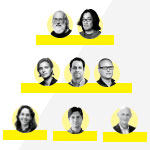 New COVID-19 research projectsIn addition to Salk’s ongoing research areas relevant to COVID-19, several new coronavirus-specific projects have recently launched. These innovative projects range from understanding the structure of the virus to mobilizing the body’s immune reaction.
New COVID-19 research projectsIn addition to Salk’s ongoing research areas relevant to COVID-19, several new coronavirus-specific projects have recently launched. These innovative projects range from understanding the structure of the virus to mobilizing the body’s immune reaction.
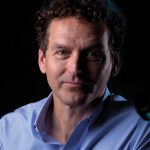 A conversation with Martin HetzerIn the last few months, Salk Vice President and Chief Science Officer Martin Hetzer spearheaded the Institute’s efforts to respond to the pandemic from both an administrative as well as a scientific perspective.
A conversation with Martin HetzerIn the last few months, Salk Vice President and Chief Science Officer Martin Hetzer spearheaded the Institute’s efforts to respond to the pandemic from both an administrative as well as a scientific perspective.
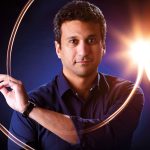 Eiman Azim – Decoding dexterityIn this Q&A, Assistant Professor Eiman Azim shares his thoughts on what’s next in neuroscience, how all scientists are philosophers and what he learned about movement from observing his newborn.
Eiman Azim – Decoding dexterityIn this Q&A, Assistant Professor Eiman Azim shares his thoughts on what’s next in neuroscience, how all scientists are philosophers and what he learned about movement from observing his newborn.
 Nasun Hah – Next gen sequencingAs the director of the Next Generation Sequencing Core, Staff Scientist Nasun Hah collaborates with everyone from plant biologists to neuroscientists to provide support and information about sequencing genes and entire genomes.
Nasun Hah – Next gen sequencingAs the director of the Next Generation Sequencing Core, Staff Scientist Nasun Hah collaborates with everyone from plant biologists to neuroscientists to provide support and information about sequencing genes and entire genomes. Update on initiatives to support diversity and BIPOCLearn about the Institute’s commitment to and actions around diversity and inclusion.
Update on initiatives to support diversity and BIPOCLearn about the Institute’s commitment to and actions around diversity and inclusion.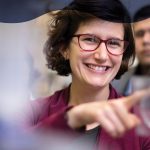 Molly MattyMolly Matty, a postdoctoral researcher in the lab of Associate Professor Shrek Chalasani, shares what worms can teach us about human behavior, why science outreach is so important and why she enjoys puns.
Molly MattyMolly Matty, a postdoctoral researcher in the lab of Associate Professor Shrek Chalasani, shares what worms can teach us about human behavior, why science outreach is so important and why she enjoys puns.





















































